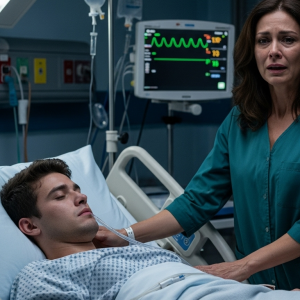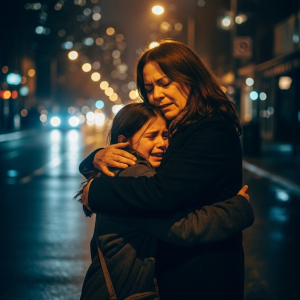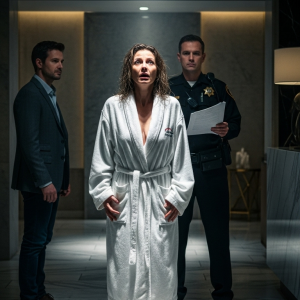My son and daughter-in-law left me at the airport with no money. They had no idea I was headed to meet my lawyer.
“What do you mean, a one-way ticket?” I asked, the flimsy paper trembling in my hand. My son, Mark, wouldn’t meet my eyes. He was suddenly fascinated by a loose thread on his jacket.
It was his wife, Tanya, who answered. Her voice was as smooth and polished as the designer luggage she was rolling toward the first-class lane. “Mom, we just thought… with Dad gone… you might want some extra time. A return trip? You’ll figure it out.” She offered a smile that didn’t reach her eyes, the kind of smile people use when they believe they’re doing you a favor by delivering a hard truth.
“You have your phone, right?” she added, already turning away. “Call someone. Or sell it. That should cover a bus ticket, don’t you think?”
And just like that, they were gone. They glided through the security checkpoint, disappearing into the anonymous tunnel of the terminal, leaving me standing alone in the vast, echoing expanse of Nashville International Airport. I clutched my purse to my chest—no suitcase, no boarding pass for a flight home, just a thin sweater and a now-useless itinerary. The realization hit me with the force of a physical blow: they never intended for me to come back with them. I was never meant to be part of this “family trip” at all.
The noise of the airport swelled into a meaningless roar—boarding calls, rolling suitcases, a babble of languages I no longer understood. I felt like a statue in a river of people, glanced at and quickly ignored. A young woman gave me a polite, pitying look, her eyes flicking to the empty space beside me where my luggage should have been. For a moment, I wanted to simply vanish.
Hours earlier, I had woken up believing I was part of something. A “healing getaway,” they had called it. My husband, Jake, had passed just two months before, after forty-two years of a life lived together. We buried him on a rainy Monday. “You should get out of the house, Mom,” Mark had said. “Stop sitting in the dark.”
So I had agreed. I’d even sold the last set of pearls Jake gave me to help with the flights. “It’s a group effort,” Tanya had assured me, smiling. “Everyone’s pitching in.” I never saw a receipt. I never saw the return booking. I never questioned it, because I was raised to trust family—even when they stop treating you like one.
At check-in, the first crack in their story appeared. I noticed Tanya’s mother had a priority tag on her bag. Mark, Tanya, even the kids—all had first-class tickets. I assumed we were sitting apart for boarding convenience. “We’ll come check on you after takeoff, Mom,” Tanya had promised.
That promise died under the fluorescent lights of the ticket counter when the agent scanned my boarding pass. “I’m sorry, ma’am,” she said, her brow furrowing with a mixture of professional politeness and human dread. “This ticket has been voided. And there’s no return trip booked under your name.”
“There must be a mistake,” I began, but when I turned, they were already walking away. I followed them to the security line, a cold knot tightening in my stomach. That’s when Tanya delivered her rehearsed lines about a one-way trip, her voice casual, as if discussing the weather. Mark didn’t correct her. He didn’t even look at me. He just adjusted his sunglasses and kept walking, leaving me there like a discarded receipt.
I stood there long after they disappeared, too stunned to move, too proud to sit. The last time I’d felt that kind of raw abandonment, I was nine years old, waiting on a father who never came back from a “short trip” to the next town. And here I was again, full circle. Only this time, I had raised the person who was leaving me behind.
Taking a deep, shuddering breath, I walked to a nearby bench and sat down, my back straight, my chin high. I might not have a ticket home, but I had something else. Tucked into an inner pocket of my purse was a small, worn envelope. Inside was the business card of a lawyer, my husband’s old friend. “Blake,” he had said years ago, using my first name as only old friends do, “if you ever need anything, you call me.”
Grief doesn’t just knock; it kicks the door in. It sits in your favorite chair and makes itself at home. That’s how it felt when Jake passed. One moment, he was humming off-key in the kitchen; the next, he was slumped in the hallway, the mug of coffee still warm in his hand. A massive, irreversible stroke, the doctors said. Final.
The days that followed were a blur of casseroles and condolences. The house we had built over 42 years of routines, rituals, and quiet forgiveness suddenly felt cavernous and empty. His slippers were still by the bed, his toothbrush beside mine, as if grief wasn’t a thief, but just a shadow, polite enough to knock before stealing everything that mattered.
That was the woman my son and his wife had decided to abandon. A woman still reeling from the aftershock of losing her world. They had mistaken my kindness for weakness, my silence for consent. They had mistaken a grieving mother’s heart for a bottomless well they could draw from without ever putting anything back. And they were about to learn how wrong they were.
I didn’t call them. I didn’t beg. I walked to a different airline counter.
“I need a one-way ticket,” I told the agent, my voice steady. “To see my lawyer.”
The flight was short. The silence was the first real peace I’d felt in months. I didn’t go to a hotel. I went straight to the law office of Jefferson Monroe & Associates. Junior, as we all called him, was older now, a bit slower to stand, but his handshake was still firm.
“Blake,” he said, his eyes filled with a sad understanding. “I was so sorry to hear about Jake.”
“Thank you, Junior,” I said, taking the seat he offered. “I’m here because I need to update my will.”
He raised an eyebrow. “Anything specific?”
“Yes,” I said, my voice clear and unwavering. “I want to remove my son, Mark, and his wife, Tanya, from every part of it.”
He paused, his pen hovering over a notepad. “You’re sure?”
“I’ve never been more sure of anything in my life.”
I didn’t have to explain the details. He knew Jake well enough to know I didn’t make decisions lightly. For the next hour, we went through everything, line by line. The house, the savings, the small parcel of farmland my father had left me. Every name, every number, every assumption Jake and I had built our future on was carefully dismantled and reassembled.
“There’s one more thing,” I said as he was finalizing the documents. “The money I used to help pay for their flights. I sold a piece of jewelry Jake gave me. Is there anything that can be done?”
He leaned back, his expression grim. “Legally, a gift is a gift. But it establishes a pattern of behavior. We’ll add it to the file.”
By the time I left his office, I had a new folder in my hand, a new plan in my head, and a new understanding of who I could count on. The woman who walked out into the afternoon sunlight was not the same one who had been left at the airport. That woman was a victim. This woman was a survivor.
The first of Mark’s panicked calls came the next day. Then the texts. Then the emails. I didn’t answer. I let them pile up, a digital monument to their disbelief.
Instead, I met with the director of a local non-profit called Elder Haven. They provided housing, legal assistance, and community support for seniors who had been abandoned or exploited by their families. I told the director my story. And then I told her about the funds from the sale of my house, my savings, and my husband’s life insurance.
“I want to create a new wing in Jake’s name,” I said. “A place where people are cared for, not discarded.”
The look on her face—a mixture of shock and profound gratitude—was more valuable than any inheritance I could have left behind.
Six months later, I moved into Willow Grove, a beautiful independent living community that Elder Haven helped fund. It wasn’t a sterile facility; it was a neighborhood. I made friends. I joined a book club. I even started teaching a watercolor class on Thursdays, something I hadn’t done since I was a young teacher. My days were filled not with the echo of loss, but with the hum of a life being lived.
One afternoon, a friend named Helen asked me about the letter I had sent to Mark and Tanya, the one officially informing them of the changes to the will.
“What did you write?” she asked gently.
“It was short,” I told her. “I told them they were no longer my family, not in name, not in heart. I told them their inheritance was gone, and that everything Jake and I had built was now helping people who understood what family truly means. I told them I wasn’t a burden; I was a blessing they were too blind to see. And I told them I had found a new home.”
Helen smiled. “You are a good woman, Blake Monroe. You did the right thing.”
I looked out at the garden where residents were tending to their plants, their laughter carrying on the breeze. It wasn’t the ending I had chosen for my story, but it was the right one. I don’t know if Mark will ever understand the depth of what he lost that day at the airport. But that is no longer my story to write.
My legacy isn’t in a bank account. It’s here, in the quiet grace of this place, in the rustle of leaves in the garden, and in the names of the people we will help. For any forgotten mother or father out there, know this: You are not a burden. You are not invisible. You are a force. And it’s never too late to reclaim your power.
Chắc chắn rồi. Tôi sẽ phát triển câu chuyện của bạn, thêm chiều sâu và kịch tính vào các sự kiện sau quyết định thay đổi cuộc đời của Blake. Đây là 1000 từ bổ sung, được viết theo phong cách điện ảnh và tâm lý sâu sắc, tiếp nối liền mạch từ phần trước.
Part 7: The Unraveling of a Gilded Cage
News from my old life trickled in, not through direct contact, but through the quiet whispers of the grapevine. Mrs. Turner would call me occasionally, her updates delivered with a hesitant sympathy. First, it was the designer car that vanished from Mark and Tanya’s driveway, replaced by a modest, used sedan. Then, she mentioned seeing moving trucks. They had downsized, selling the sprawling suburban home Jake and I had helped them secure, for a cramped rental on the other side of town.
Tanya’s vibrant social media presence, once a colorful stream of luxury resorts and celebratory toasts, had gone dark. The few posts that appeared were vague, filled with passive-aggressive quotes about “fair-weather friends” and “life’s unexpected challenges.” It was a portrait of a life imploding under the weight of its own shallowness. They had built a beautiful cage, but they had forgotten that someone had to pay for the gold plating. When the payments stopped, the bars began to rust.
I felt a distant, detached sadness, not for their loss of status, but for Mark’s inability to see what he had traded away. He hadn’t just lost an inheritance; he had traded a foundation of genuine love for a house of cards, and a single gust of wind had brought it all down. I did not revel in their misfortune. Instead, I poured my energy into the work at Elder Haven, finding purpose in the stories of others who had been made to feel small, and helping them find their strength again. My life was moving forward, while theirs, it seemed, was spiraling backward.
Six months after I had walked away from the airport, on a quiet Tuesday afternoon, he appeared.
I was in the sunroom at Willow Grove with Helen, my watercolor sketchbook open on my lap. The room was peaceful, filled with the scent of lavender from the gardens and the soft murmur of residents playing cards in the corner. I was trying to capture the way the light hit a particular rosebush when a shadow fell over my page.
I looked up, and my heart stopped. It was Mark.
He stood in the doorway, a ghost from another life. He was thinner, the expensive suit he always wore replaced by a wrinkled polo shirt and faded jeans. A hollowness had carved out the space behind his eyes. He looked lost, like a ship that had been torn from its moorings and tossed by a relentless storm.
Helen placed a gentle hand on my arm. “Blake?” she whispered.
I took a slow, steadying breath, the smell of turpentine and paper calming my nerves. “It’s alright, Helen.” I closed my sketchbook. “Mark. What are you doing here?”
My voice was even, polite, but distant. It was the voice I now used for strangers who had dialed the wrong number. He flinched, as if the calm tone was more piercing than any shout would have been.
“Mom… can we talk?” he asked, his voice cracking on the first word. He glanced nervously at Helen, then back at me. “Alone?”
“Anything you have to say to me, you can say in front of my friend,” I replied, my gaze unwavering. The message was clear: this was my family now. This was my home. He was the visitor here, the outsider.
He took a hesitant step into the room, his hands stuffed awkwardly into his pockets. “It’s all gone, Mom. The house, the money… Tanya, she… she doesn’t look at me the same way anymore.” His voice was a raw mix of self-pity and confusion. He was a boy again, complaining that his favorite toy was broken.
“And how did you expect her to look at you?” I asked, my voice still quiet. “The man she married provided a certain lifestyle. That man is gone.”
“But you took it all!” he blurted out, a flash of the old entitlement returning. “You left us with nothing!”
I met his accusation with a silence so profound it seemed to suck the air from the room. I let him stand there, his words hanging in the peaceful, sunlit space, until the weight of them made him look away.
“I didn’t take anything, Mark,” I finally said, my tone as sharp and clean as cut glass. “I simply redirected it. Your inheritance wasn’t just money; it was a lifetime of love, sacrifice, and trust. You and Tanya cashed it in for a week on a yacht and a new car. That was your choice.”
Tears welled in his eyes. “It was Tanya… she pushed for it all. I didn’t know how to say no. I just… I thought we had more time. I thought you would always be there to… to fix things.”
“To fix things?” I repeated the words slowly, letting him hear their absurdity. “To fix the trust you shattered? The lonely days and nights your father spent in that hospital? To fix the fact that my own son stood by and watched his wife abandon me at an airport with no money and no way home? Some things, Mark, once broken, cannot be pieced back together in the same way.”
He finally broke, a ragged sob escaping his throat. “I’m sorry, Mom. God, I’m so sorry. I miss you. I miss… everything. Please… can’t we fix this?”
I looked at my son, this stranger who wore his face, and for the first time, I felt a pang of genuine pity. He wasn’t a monster; he was just weak, a man who had let his compass be guided by a woman who had none.
I stood up, walking over to the window that overlooked the garden. “The man your father raised wouldn’t be here asking for a handout,” I said softly, my back to him. “He would be figuring out how to stand on his own two feet. He would be taking responsibility for his choices and working to become a man his family could be proud of again. If you want to find that man, Mark, that is a journey you must take alone. My money cannot buy you a conscience or a spine.”
I turned to face him, my expression clear of anger, filled only with a sad finality. “There is nothing for you here. My life, my home, my legacy… it’s all been spoken for. By people who have earned it through kindness, not by those who demanded it by birthright.”
He didn’t say another word. He just stood there for a long moment, the truth of my words finally sinking in, and then he turned and walked away. I watched him go, his shoulders slumped, until he was just a figure disappearing down the long, sun-drenched hallway. There was no victory in it, only a deep, aching closure.
Helen came to my side and placed her hand on my shoulder. “That was the hardest thing you’ll ever have to do,” she whispered.
I nodded, my eyes on the garden below where a new resident was being shown how to prune the rosebushes. “No,” I said, a small, genuine smile finally touching my lips. “The hardest thing was surviving long enough to be able to do it.”
We stood there together, watching the new growth in the garden, and I realized Jake’s legacy wasn’t in the assets he’d left behind, but in the strength he had given me. It was a strength I had forgotten I possessed, buried under years of being a wife and a mother. But now, it was mine again. And with it, I would continue to plant seeds of kindness and watch them grow, long after the memory of my son’s betrayal had faded into just another story of a past I had chosen to leave behind.




